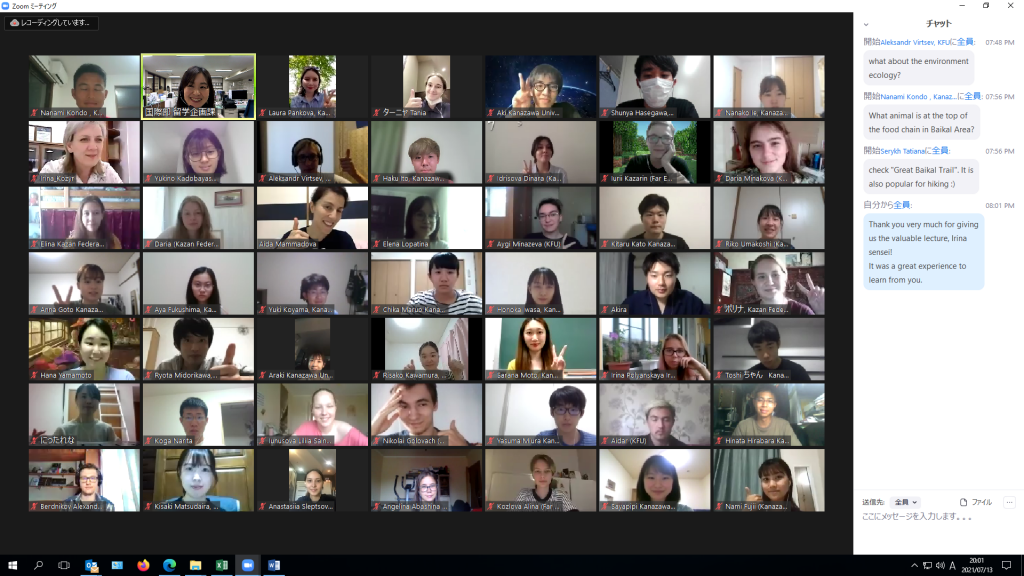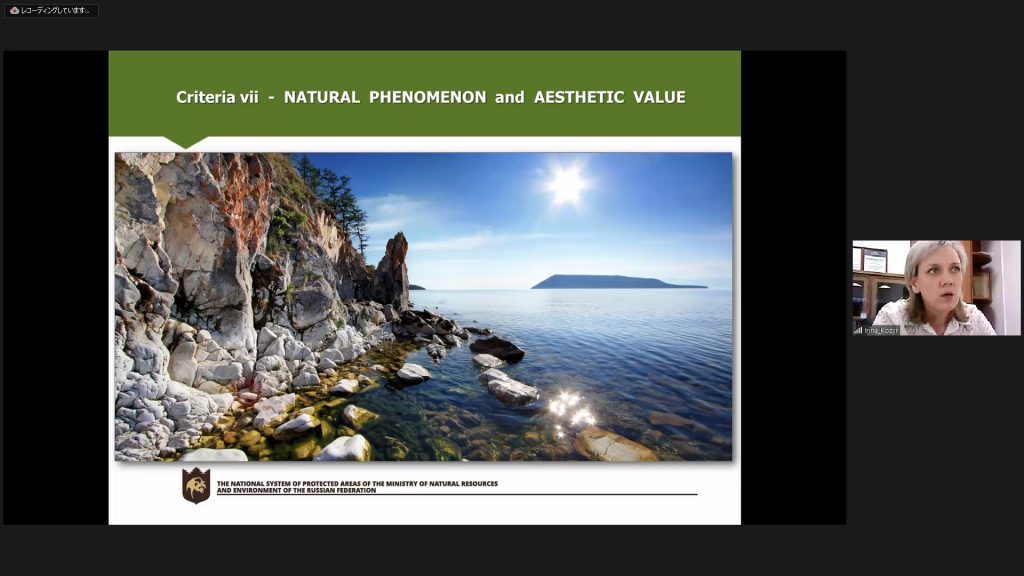
Topics
2021.07.28
NEWS
文化交流プログラムにてユネスコエコパークに関するオンライン研修と学生交流を実施
Japanese and Russian Students Join Online Training and Student Exchange on UNESCO Biosphere Reserves as Part of Cultural Exchange Program (Inbound and Outbound course)
7月12‐16日の5日間、金沢大学は、文化交流プログラムの一環として、日本とロシアのユネスコエコパーク(ユネスコの「人間と生物圏(MAB)計画」で指定された生物圏保護区: BR; Biosphere Reserve)から自然と文化多様性を学ぶオンライン研修コースを実施しました。金沢大学と大学コンソーシアム石川の大学生43名と、ロシアの大学生38名が、オンライン研修および学生交流に参加しました。
オンライン研修では、金沢大学および日露のユネスコエコパークによるオンライン講義・教材が提供され、学生たちは、ロシアのBR4か所(ヴォルガ・カマBR、カトゥンBR、アルタイBR、バイカルBR)と、日本のBR4か所(白山BR、みなかみBR、大台ケ原・大峯山・大杉谷BR、綾BR)での自然保護の取組について学び、持続可能な発展について考えました。また、互いの国の自然保護への取組における共通点と相違点、文化の違いなどについて話し合いました。
5日間を通し、石川の4大学(金沢大学、金沢星稜大学、金沢医科大学、北陸先端科学技術大学院大学)の学生43名とロシアの5大学(カザン連邦大学、極東連邦大学、国立イルクーツク大学、国立アルタイ大学、サンクトペテルブルク国立大学)の学生38名が学生交流を行い、9グループに分かれ、ユネスコエコパークに関することや、自然を守りながらどうやってSDGsの目標を達成するかなど、様々なテーマでディスカッションしました。
また本プログラムでは、ロシア人学生に対し、日本文化をより理解できるよう日本語集中コースを提供し、日本人学生には事前研修で基本のロシア語フレーズを紹介しました。
On July 12-16, we have conducted Online Training course to learn about Natural and Cultural Diversity from the Japanese and Russian Biosphere Reserves designated by the UNESCO’s “Man and Biosphere” Programme. 43 students from Kanazawa University and University Consortium Ishikawa and 38 students from Russian Universities joined online training and student exchange as part of Cultural Exchange Program.
Online lectures and study material were provided by Kanazawa University and representatives of Russian and Japanese UNESCO Biosphere Reserves. Students learned about Sustainable Development and activities towards the nature conservation from 4 Russian Biosphere Reserves (Volga-Kamsky BR, Katunskiy BR, Altaiskiy BR and Baikalsky BR) and from 4 Japanese Biosphere Reserves (Mount Hakusan BR, Minakami BR, Mount Odaigahara, Mount Omine and Osugidani BR, and Aya BR). Students also learned about the similarities and differences of environmental initiatives towards nature protection and cultural differences between each other's countries.
Over five days, 43 students from KU and UCI had online student exchange with 38 students from five Russian universities (Kazan Federal University, Far Eastern Federal University, Irkutsk State University, Altai State University, Saint Petersburg State University). During this event, students broke up into nine groups and discussed various topics related to UNESCO Biosphere Reserves and how to achieve Sustainable Development Goals through the nature conservation.
This course also provided intensive studies of Japanese language for Russian students, to better understand Japanese Culture, and basic Russian language was also introduced to Japanese students.





